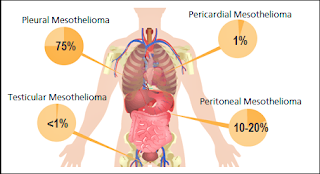Mesothelioma Treatment Radiation Therapy
Mesothelioma Treatment - Radiation therapy is the use of high-energy x-rays or other particles to destroy cancer cells. A doctor who specializes in providing radiation therapy to treat cancer is called radiation oncology. The most common type of radiation treatment is called external beam radiation, which is radiation given from the machine outside the body.
Radiation therapy regimens, or schedules, usually consist of a certain number of treatments that are administered over a period of time.

Pleural Mesothelioma It is challenging to treat pleural mesothelioma with radiation therapy because of the risk of lung damage. When 1 of 2 lungs has been surgically removed, radiation therapy is often given to the chest cavity to decrease the risk of mesothelioma returning in the chest. For example, this approach can be used after extrapleural pneumonectomy (see Surgery, above). For some patients, radiation therapy can be administered to a smaller area to help relieve symptoms such as pain (see Getting treatment for symptoms and side effects, below).
Peritoneal mesothelioma. For patients with peritoneal mesothelioma, radiation therapy throughout the abdomen causes severe side effects and is not performed. If the patient has pain in a particular area, radiation therapy may be an option to help relieve pain (see Treatment of symptoms and side effects, below).
Side effects of radiation therapy may include fatigue, mild skin reactions, abdominal pain, and bowel movements. Most side effects disappear as soon as treatment is complete. Learn more about the basics of radiation therapy.
Radiation therapy regimens, or schedules, usually consist of a certain number of treatments that are administered over a period of time.

Pleural Mesothelioma It is challenging to treat pleural mesothelioma with radiation therapy because of the risk of lung damage. When 1 of 2 lungs has been surgically removed, radiation therapy is often given to the chest cavity to decrease the risk of mesothelioma returning in the chest. For example, this approach can be used after extrapleural pneumonectomy (see Surgery, above). For some patients, radiation therapy can be administered to a smaller area to help relieve symptoms such as pain (see Getting treatment for symptoms and side effects, below).
Peritoneal mesothelioma. For patients with peritoneal mesothelioma, radiation therapy throughout the abdomen causes severe side effects and is not performed. If the patient has pain in a particular area, radiation therapy may be an option to help relieve pain (see Treatment of symptoms and side effects, below).
Side effects of radiation therapy may include fatigue, mild skin reactions, abdominal pain, and bowel movements. Most side effects disappear as soon as treatment is complete. Learn more about the basics of radiation therapy.





